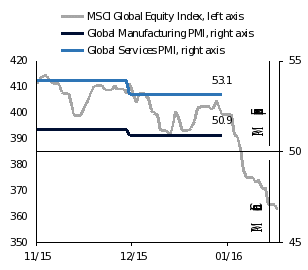Last week we examined the reasons behind the collapse in financial markets during the first week of the year (China’s devaluation creates spillover risks in some EMs). We determined that the trigger was China’s currency devaluation and that the market response was probably overdone. Since then, markets have continued their free-fall despite China’s currency actually strengthening marginally. Therefore, we have turned our attention to recent indications of weakening global activity to determine to what extent this explains the poor financial market performance. Although there was a concerning slump in global GDP growth in Q4 2015, current and forward-looking indicators of economic activity suggest that the market selloff may be overdone.
So far this year, global stock markets fell around 11%. The losses were concentrated in China (down 16%), but emerging markets, Europe, Japan and the US all faced declines of 9% to 13%. These losses came despite expectations that the spillovers from events in China will be limited. Goldman Sachs estimates that a hard landing in China combined with a sizeable renminbi depreciation and tighter Chinese financial conditions would only lower GDP growth in the US, Europe and Japan by 0.2-0.3 percentage points. This begs the question, why have equity markets fallen so widely and so sharply?
There is some evidence that global economic activity softened at the end of last year. Overall, world real GDP growth in 2015 is now likely to come in below 3%, down from 3.1% a few months ago. Some of the largest recent downward revisions to real GDP growth have been in the US. Estimates for Q4 2015 real GDP growthhave been revised down from over 2% at the end of November to 0.5% in the most recent Bloomberg survey. It is both US industry and consumers that have been underperforming. The latest data release for industrial production and retail sales for December showed contractions of 0.4% and 0.1% respectively.
In fact, industrial production appears to be going through a global slump, leading to significant downward revisions to GDP growth in the world’s big manufacturing nations. Germany is only expected to have grownby 0.5% to 1.5% in Q4 2015, compared with market expectations of over 2% two months ago. Japan has also faced downward revisions to its Q4 GDP estimate of around 0.5% to below 1%. Finally, China’s industrial production slowed more than expected in December, rising 5.9% year on year compared with 6.2% in November.
As a result, much hope for global growth this year is pinned on the consumer. A number of forces should be supporting consumption. Lower oil prices should have freed up income for spending. In the US, the focus of global consumption, a strong labour market, a recovery in the housing sector and strong consumer confidence surveys, suggest that consumers should be splurging. However, recent weakness in retail sales in the US,the Eurozone and China suggest that households are mostly saving recent windfalls.
Nonetheless, with all the positive tailwinds, consumer spending is still expected to pick up this year. Forward looking indicators support this view. Purchasing Managers Indices (PMIs) survey corporate executives about new orders, inventories, production, deliveries and employment. The latest PMIs in the US and Eurozone are high, indicating a continued expansion in economic activity. The expansion is stronger in services than manufacturing, suggesting that consumer spending is strong.
Global equity markets and PMIs

Mainly due to strong PMI data, a number of measures of current economic activity, also known as “nowcasts”, are not registering the slowdown in global growth. Nowcasts give a moretimely view of the state of the economy than GDP, which takes time to collate and release. For example, JP Morgan’s nowcast, which includes timely data such as PMI surveys, estimates that global activity grew 2.6% in Q4 2015, compared with an estimate for global real GDP growth of 1.4%.
This view is in line with consensus forecasts of global 2016 GDP growth, which is still widely expected to remain above 3%. A critical factor supporting growth this year could be looser monetary policy from global central banks. The continued rout in global oil and other commodity markets means that inflation is likely to remain low this year. This will create room for central banks to ease monetary policy, supporting growth. Expectations for more monetary support from the European Central Bank in March are mounting and the probability of another Fed rate hike in March has receded from over 50% at the beginning of the year to around 28% today, based on financial markets.
In conclusion, the slowdown in global GDP growth in Q4 2015 is concerning. However, the scale of the selloff in global equity markets seems to point to a relatively high risk of recession in developed markets and a hard landing in China. We would argue that the selloff appears overdone, given that the current outlook for global activity is not as grim as the reaction of financial markets suggests.
